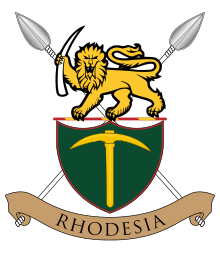
Back Fuerzas de Seguridad de Rodesia Spanish Forces armées rhodésiennes French כוחות הביטחון של רודזיה HE ローデシア軍 Japanese Родезийские силы безопасности Russian Rodezya Güvenlik Kuvvetleri Turkish 罗得西亚安全部队 Chinese
| Rhodesian Security Forces | |
|---|---|
 Emblem of the Rhodesian Army. Following the declaration of a republic in 1970, St Edward's Crown was removed. | |
| Founded | 1964 |
| Disbanded | 1980 |
| Service branches | |
| Headquarters | Salisbury |
| Leadership | |
| Commander-in-Chief | See list |
| Minister of Defence | See list |
| Head of the Rhodesian Armed Forces | See list |
| Related articles | |
| History | Rhodesian Bush War |
| Ranks | Military ranks |
The Rhodesian Security Forces were the military forces of the Rhodesian government. The Rhodesian Security Forces consisted of a ground force (the Rhodesian Army), the Rhodesian Air Force, the British South Africa Police, and various personnel affiliated to the Rhodesian Ministry of Internal Affairs. Despite the impact of economic and diplomatic sanctions, Rhodesia was able to develop and maintain a potent and professional military capability.[1]
The Rhodesian Security Forces of 1964–80 traced their history back to the British South Africa Company armed forces, originally created during company rule in the 1890s. These became the armed forces of the British self-governing colony of Southern Rhodesia on its formation in 1923, then part of the Federation of Rhodesia and Nyasaland military in 1953. After the break-up of the Federation at the end of 1963, the security forces assumed the form they would keep until 1980.
As the armed forces of Rhodesia (as Southern Rhodesia called itself from 1964), the Rhodesian Security Forces remained loyal to the Salisbury government after it unilaterally declared independence from Britain on 11 November 1965. Britain and the United Nations refused to recognise this, and regarded the breakaway state as a rebellious British colony throughout its existence.
The security forces fought on behalf of the government against the Zimbabwe African National Liberation Army and the Zimbabwe People's Revolutionary Army—the military wings of the Marxist–Leninist black nationalist Zimbabwe African National Union and Zimbabwe African People's Union respectively—during the Rhodesian Bush War of the 1960s and 1970s.
The Lancaster House Agreement and the return of Rhodesia to de facto British control on 12 December 1979 changed the security forces' role altogether; during the five-month interim period, they helped the British governor and Commonwealth Monitoring Force to keep order in Rhodesia while the 1980 general election was organised and held. After the internationally recognised independence of Zimbabwe in April 1980, the Rhodesian security forces, the Zimbabwe African National Liberation Army and the Zimbabwe People's Revolutionary Army were integrated to form the new Zimbabwe Defence Forces. Around 5,000 Rhodesian military and intelligence personnel were recruited by South Africa in 1980 as part of Operation Winter.
- ^ Rogers 1998, p. 41